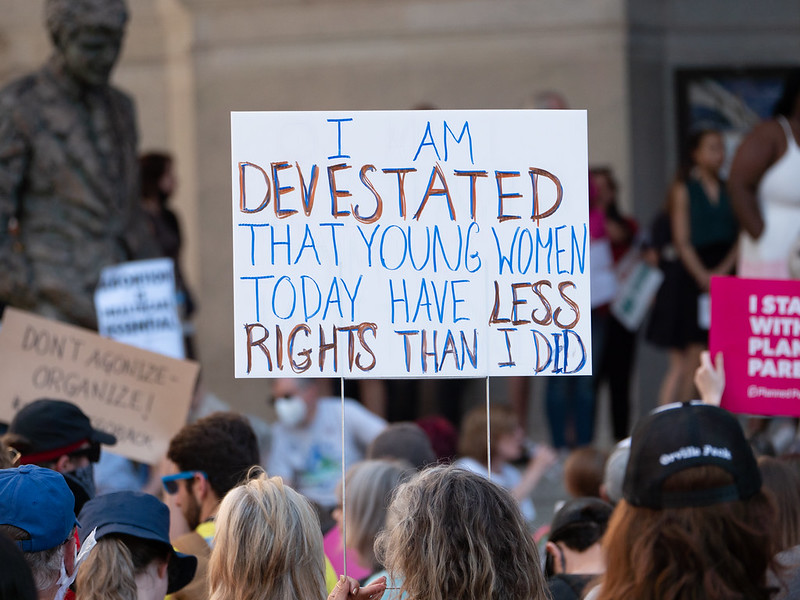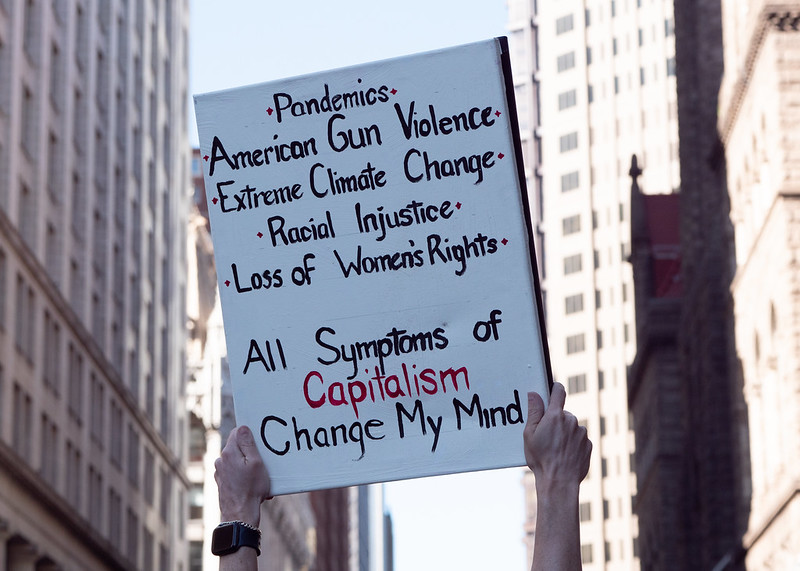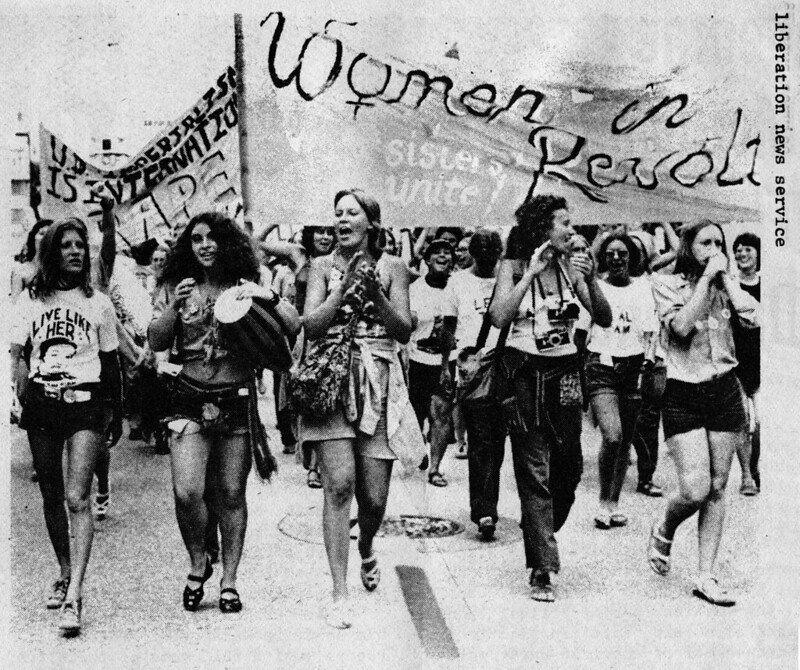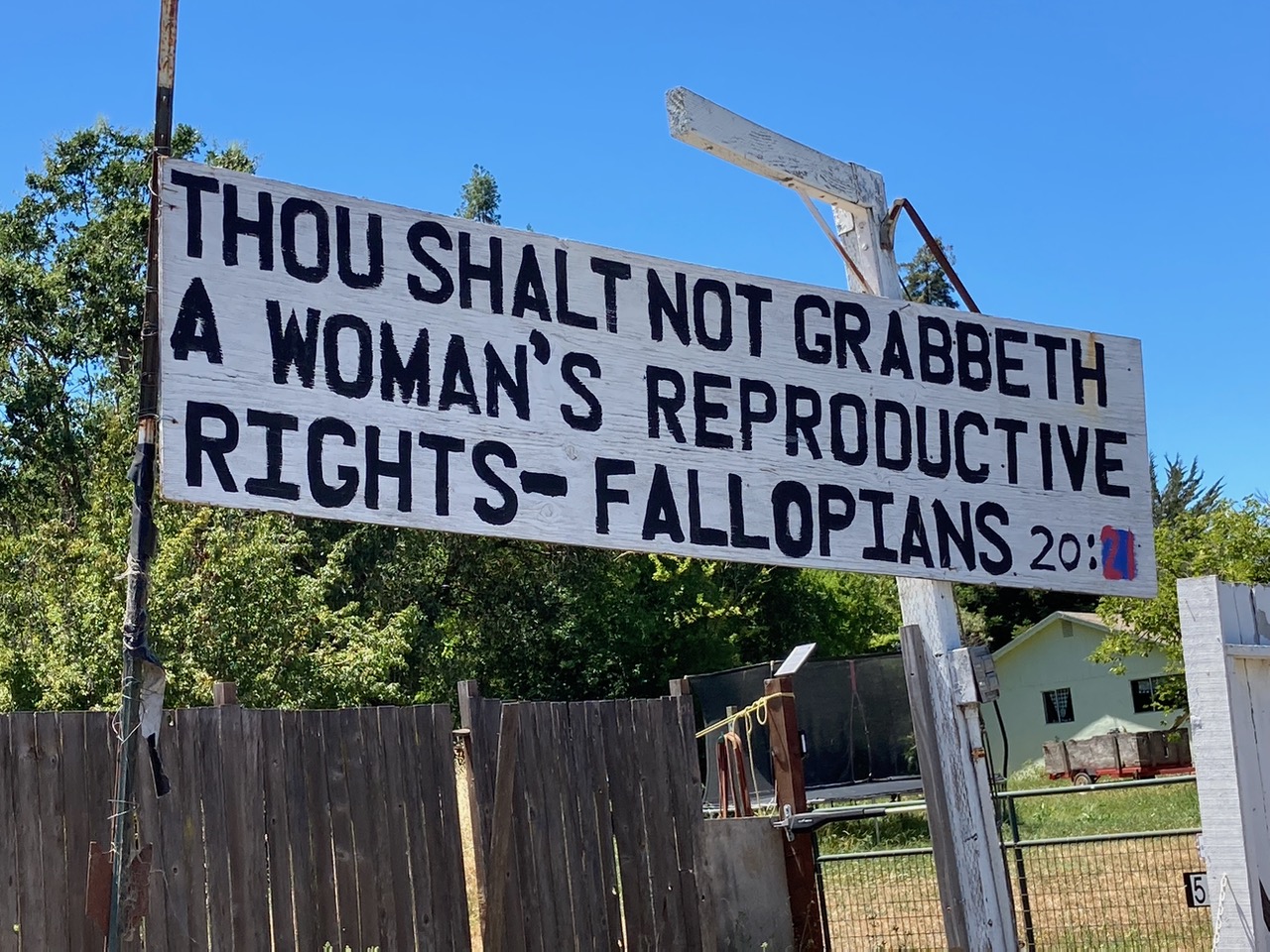Essay by Martha Nichols
After Roe, the Power of Our Imperfect History

To Those Who Think We Can’t Fight Back:
Don’t allow what the Supreme Court has done to bend or break your spirit.
We’ve been here before. I admit to feeling lashed by despair. I have little faith in those in power, even if they’re supposedly on my side. But here’s the thing: I never did have faith in the people in power, especially the men—and I and other second-wave feminists need to do more witnessing about what it felt like to fight back then and why we need to keep fighting.
In the late 1970s, I was a student at Reed College, and a group of us students went down many Saturday mornings to the Lovejoy Clinic in Northwest Portland, Oregon, as counter-protesters. We linked arms and sang to drown out the anti-abortion protesters who gathered with their ugly signs of fetuses and hellfire. The male protesters shouted curses at any woman going into the clinic. The women kept their heads down and hands clenched. The protests at Lovejoy and elsewhere continued for decades, with firebombs discovered on the property in the 1990s, threats to clinic workers, and doctors’ personal information doxed.
All you wonderful, fervent young activists are probably wiser than I am about this messed-up world. But please don’t sweep every member of the older generation into the same ostrich hole. We didn’t all ignore impending threats to the environment or civil liberties. I thought of myself as part of a much larger movement. It was not boutique politics for me. The Roe decision wasn’t even a decade old when I got an abortion. I remember how upset I was at the time and yet the gratitude I felt that abortion was legal—that I could go to Planned Parenthood, talk to a counselor, not be pressured into anything, and make the choice I had to.
 Abortion is a visceral issue for women, real in a way it can never be for men. Yet it’s not just a women’s issue, because it represents social inequality so starkly and provocatively. And here’s where I want to urge not only collective action but also a profound shift in mindset—one that moves beyond self-interest and identity politics to empathize with the situation of others.
Abortion is a visceral issue for women, real in a way it can never be for men. Yet it’s not just a women’s issue, because it represents social inequality so starkly and provocatively. And here’s where I want to urge not only collective action but also a profound shift in mindset—one that moves beyond self-interest and identity politics to empathize with the situation of others.
I will listen to you, if you will listen to me, and the listening part is key. I don’t need everyone to believe exactly what I do or to mouth the same arguments. For my generation of feminist activists, many social movements from the 1950s and 1960s—especially the civil rights movement—served as models for working across political divides for a common cause. The impact of such movements felt real. I believed, and still believe, that we’re all in this together.
Yet the identity-based politicking of social media leaves little room for empathizing with those who aren’t from your same group. Too many earnest people end up castigated for not “getting it.” I say we treat each other kindly, fighting for the civil rights of everyone. This is, of course, the point Chimamanda Ngozi Adichie makes in her 2014 We Should All Be Feminists. Then in 2021, Adichie herself said she felt insulted by two young writers, responding with what the Guardian called a “blistering essay against social media sanctimony.”
Such battling among progressives saddens me. It also makes me want to shake the younger generation by their piercings, turning me into a mommy stereotype—until I stop and think.
One recent strand of opinionating I’m disturbed by is the belief among younger women that feminism no longer matters and isn’t “trendy” (see White FeministTM, circa 2015). Again, we’ve been here before. A filmmaker friend of mine, Marcia Jarmel, made a short documentary called The F Word: A Short Video About Feminism in 1994.
But think about why the word feminist generates such animosity in popular media. Please stop and think, whatever your age, because plenty of Boomers and Gen-Xers laugh at feminists, too. We’ve been trained to do so. The people in power fight hardest against threats to their status, and one of their strongest weapons is ridicule. Consider Anita Hill, Monica Lewinsky, Amber Heard—and many other women who have been publicly shamed and turned into jokes by male accusers.
Second-wave feminism, particularly among white activists, was fractious and imperfect, and some of its premises deserve to be reexamined by younger feminists, especially those of color. Still, I call myself a feminist, and I want others to feel empowered to do so with me. When I hear anyone dismiss the gains of the women’s movement because it was supposedly led by a bunch of wealthy Sheryl Sandbergs “leaning in,” I get mad. That’s not true. Far more distressing is how much of recent history has been erased by digital media. See Lynn Povich’s The Good Girls Revolt for just one example of how a discrimination suit brought by Newsweek women in 1970 faded into nonexistence in the magazine’s own archives.
So, let’s not forget the protests that came before just because there’s a backlash now.
Don’t allow the decision of a few conservative judges to sap you of the will to fight back. And don’t shrug this off because it doesn’t directly affect you. Practice empathy, cultivate care for those who will surely be hurt, and look back at history to see how others have fought back.
Don’t let the Court’s decision to overturn Roe—or the increasingly distressing findings of the January 6 hearings—or the continuing disaster of climate change—make you give up.
Let’s remember together, because I’m not giving up.
Love,
Martha

How to Take Action
Spread the word! Here are a few article links with suggestions for political action at all levels in the wake of the Supreme Court’s decision. Circulate these links—in community settings such as homeless shelters and libraries and on social media—especially about the organizations listed.
Mad About Roe? Here’s What to Do Now (Robin Marty, New York Times, June 24, 2022)
This activist, freelance reporter, and author of Handbook for a Post-Roe America, moved to Alabama in 2021 to work for abortion rights there. Her article highlights organizations helping women travel to other states for abortions or who need additional aid. Following are a few quotes of note:
- “Spread the word about AidAccess.org, a group based in Austria that can mail the same abortion-inducing medication that we, until recently, provided in our clinic.”
- “Direct people who are seeking legal advice to the group If/When/How: Lawyering for Reproductive Justice, which provides a confidential legal help line and a legal-defense fund to assist people who get tied up in the criminal justice system because of the outcomes of their pregnancies.”
- “Abortion rights supporters also should protect family, friends and allies from surveillance with Digital Defense Fund’s online security guidance for phones and computers.”
“There’s a Way to Outmaneuver the Supreme Court, and Maine Has Found It” (Aaron Tang, New York Times, June 23, 2022)
This law professor at UC Davis (and a former clerk of Justice Sotomayor) runs through promising legal actions states can take—and individuals can pressure their reps to take—to defang the Supreme Court’s recent rulings against gun control and private-school admissions as well as Roe:
- “Maine’s example shows that those on the losing end of a case can often outmaneuver the court and avoid the consequences of a ruling.”
- “Because of the sweeping nature of the court’s decision, there are some limits on what pro-choice states can do alone. But at a minimum, lawmakers should act vigorously to ensure that abortion providers are able to serve out-of-state patients unable to obtain care in their home states.”
Also see the NYT’s ongoing coverage of efforts to combat the Court’s decision, including: “Judges Block Utah and Louisiana Abortion Laws Amid Flurry of Legal Action” (June 27, 2022).
“Pride March in New York City Infused With a New Sense of Urgency” (Matthew Haag, Chelsie Rose Marcius, and Lauren McCarthy, New York Times, June 26, 2022)
Be sure to watch the video with Planned Parenthood leading the march. I teared up, listening to young activists. Their response fills me with hope.
I’m traveling in California at the moment, but the Friday before, I cheered a small group of young women protesting for reproductive rights on a dusty intersection in Santa Rosa. And the same weekend as the Pride marches in NYC and San Francisco, a friend of mine snapped this photo near Sebastopol, California:

Art Information
- "I Am Devestated" and "All Symptoms of Capitalism" signs © Mark Dixon (June 24, 2022, Pittsburgh protest); Creative Commons license.
- "Women March Against Nixon: 1972" © Washington Area Spark; Creative Commons license.
- "Thou Shall Not Grabbeth" sign © Sanford T. Rose (Sebastopol, California); used by permission.
 Martha Nichols co-founded Talking Writing and is a faculty instructor in the journalism program at the Harvard University Extension School. Much of her teaching craft appears in her recent book First-Person Journalism: A Guide to Writing Personal Nonfiction with Real Impact (Routledge, 2022).
Martha Nichols co-founded Talking Writing and is a faculty instructor in the journalism program at the Harvard University Extension School. Much of her teaching craft appears in her recent book First-Person Journalism: A Guide to Writing Personal Nonfiction with Real Impact (Routledge, 2022).
For more information, subscribe to her newsletter and website: Martha Nichols Writer.
